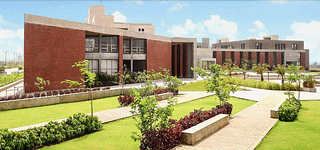BHMS Latest Updates
05 Jan, 2026 KEAM 2026 registration has started; apply on or before 31st January, 2026. Apply Here.
The BHMS 1st Year Syllabus includes subjects like Homeopathic Philosophy, Homeopathic Materia Medica, Clinical Medicine, and Therapeutics. These subjects provide students with fundamental knowledge and skills essential for a career in healthcare.
In the 1st year of the BHMS program, students engage in diverse teaching methods, including classroom lectures and clinical internships. This comprehensive approach equips students with both theoretical knowledge and valuable real-world experience, providing essential clinical exposure.
The BHMS course is a 5.5-year undergraduate program in healthcare. It includes a 1-year internship and encompasses theoretical study, practical training, and research exploration. Eligibility requires a minimum of 50% marks in 10+2 with Physics, Chemistry, Biology, and English as compulsory subjects.
Check: BHMS Jobs
Top BHMS Colleges
Prominent institutions in India, like Dr. D. Y. Patil Vidyapeeth, Bharati Vidyapeeth Deemed University, and more, offer BHMS programs with experienced faculty and diverse fee structures, prioritizing quality education in homeopathy. Here are some of the BHMS Colleges in India.
| College Name | Fees |
|---|---|
| Dr. D. Y. Patil Vidyapeeth | INR 50,000 |
| Madhav University | INR 67,000 |
| Bharati Vidyapeeth Deemed University | INR 81,000 |
| YBN University | INR 87,000 |
| RKDF University | INR 89,500 |
| Jayoti Vidyapeeth Women’s University | INR 99,800 |
| P.P. Savani University | INR 19,101 |
| Homoeopathy University | INR 64,515 |
| Tantia University | INR 79,500 |
| Vidhyadeep Group of Colleges And School | INR 74,595 |
Check:
BHMS 1st Year Subjects Electives
In the first year of BHMS, students complete two semesters. Core subjects, including Human Body Anatomy, Physiology, and Human Body Histology, offer a foundational understanding of the human body. Elective courses provide exposure to various aspects of homeopathy and related fields, allowing students to explore specific interests.
| Semester 1 | Semester 2 |
|---|---|
| Homoeopathic Pharmacy | Human Body Anatomy |
| Physiology including Biochemistry | Human Body Histology |
| Elective-1 | Organon of Medicine - I |
| Elective-2 | Principles of Homoeopathic Philosophy and Psychology - I |
| Homoeopathic Materia Medica - I | Human Body Embryology |
Compare:
BHMS 1st Year Syllabus: Important Books
In the first year of BHMS, students delve into the fundamentals of homeopathy, anatomy, physiology, and other foundational subjects. Essential books for this stage include:
| Book Name | Author |
|---|---|
| Anatomy: "Human Anatomy" | B.D. Chaurasia |
| Physiology: "Textbook of Medical Physiology" | Guyton and Hall |
| Materia Medica: "A Concise Repertory of Homoeopathic Medicines" | Dr. S.R. Phatak |
| Psychology: "Psychology" | Ciccarelli and White |
| Community Medicine: "Park's Textbook of Preventive and Social Medicine" | K. Park |
| Microbiology: "Robbins Basic Pathology" | Vinay Kumar, Abul Abbas, and Jon Aster |
| Forensic Medicine and Toxicology: "Textbook of Forensic Medicine and Toxicology" | Narayan Reddy |
Check: Allopathic after BHMS
BHMS 1st Year Syllabus: FAQs
Ques. What career options are available after completing BHMS?
Ans. BHMS graduates can pursue private practice, work in homeopathic clinics, engage in research, teach, or explore related fields like naturopathy. Postgraduate studies and collaboration with conventional medical practitioners are also viable options.
Ques. Is BHMS recognized internationally?
Ans. BHMS programs are recognized internationally, enabling graduates to practice homeopathy abroad, provided they meet local licensing requirements.
Ques. Can BHMS graduates work alongside conventional medical practitioners?
Ans. Yes, BHMS practitioners can collaborate with conventional medical professionals based on mutual understanding and patient needs.
Ques. What is the difference between BHMS and MBBS?
Ans. BHMS focuses on homeopathic medicine, while MBBS focuses on allopathic medicine. Students should choose based on their interest in homeopathy or allopathy.
Ques. Are there specific entrance exams for BHMS programs?
Ans. Entrance exams vary by region and institution. Common ones include NEET and country-specific tests.
Ques. How can students ensure success in clinical training during BHMS?
Ans. Success in clinical training involves active participation, interpersonal skills, attention to detail, and patient care commitment.
Ques. Are there opportunities for postgraduate studies after BHMS?
Ans. Yes, BHMS graduates can pursue an MD in Homeopathy or engage in research-based studies to specialize further.
Ques. Are there opportunities for BHMS graduates in health NGOs?
Ans. BHMS graduates can contribute to health NGOs by providing homeopathic healthcare solutions and participating in outreach programs.
Ques. Can BHMS graduates specialize in a particular disease or condition?
Ans. Yes, BHMS graduates can specialize in fields such as pediatrics, dermatology, or mental health within homeopathy.
Ques. Can BHMS graduates open their own homeopathic clinics?
Ans. Yes, with the necessary licenses and permits, BHMS graduates can open and manage their own homeopathic clinics.
Ques. Can BHMS graduates practice allopathic medicine after additional qualifications?
Ans. BHMS graduates can practice allopathic medicine after pursuing approved medical programs and meeting regulatory requirements.
Ques. Are there opportunities for BHMS graduates in medical research?
Ans. Yes, BHMS graduates can engage in medical research, particularly in homeopathy, by conducting studies and trials.
Ques. Can BHMS graduates pursue teaching careers in homeopathic colleges?
Ans. Yes, after gaining practical experience and higher qualifications, BHMS graduates can become professors and instructors in homeopathic colleges, shaping the next generation of practitioners.



![Dr DY Patil Vidyapeeth - [DPU]](https://image-static.collegedunia.com/public/college_data/images/appImage/25698_1464176959DPU-Buillding.jpg?h=150&w=320&mode=stretch)
![Government Medical College and Hospital - [GMCH]](https://image-static.collegedunia.com/public/college_data/images/appImage/10471_GMCLUD_APP.jpg?h=150&w=320&mode=stretch)
![Guru Gobind Singh Indraprastha University - [GGSIPU]](https://image-static.collegedunia.com/public/college_data/images/appImage/25450_1.jpg?h=150&w=320&mode=stretch)


![Rajiv Gandhi University of Health Sciences - [RGUHS]](https://image-static.collegedunia.com/public/college_data/images/appImage/1765351929RajivGandhiUniversityofHealthScience.jpg?h=150&w=320&mode=stretch)



Comments